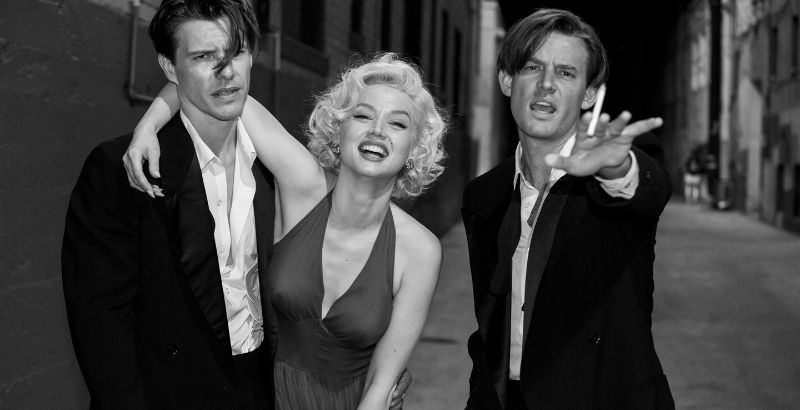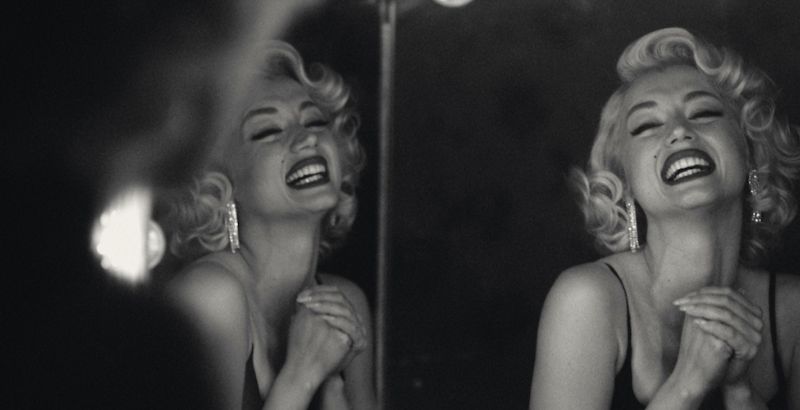
Blonde is a work of historical fiction, based on the novel by Joyce Carol Oates. Directed and written by Andrew Dominik, Blonde has been marketed by Netflix as a biopic, but it’s more psychological drama than a story of truth. That doesn’t mean that it doesn’t tap into the pain and trauma that Norma Jeane Mortenson faced and the distance she put between herself and her stage persona as Marilyn Monroe. Bathed in an artful meanness, Blonde is a lot to watch with domestic abuse, suicidal ideation, sexual assault, rape, and the pure pain of being ground to bits in the Hollywood machine.
We all know that Marilyn Monroe’s life was a tragedy from the moment she was born. We know as much through her interviews and documents about her life. That is factual. But to showcase that pain takes a deft hand that interrogates it with empathy, especially when an actress like Ana de Armas acts with her whole body to bring to life the loneliness, fear, and vulnerability in the most emotional and traumatic moments of the film. That said, Dominik finds himself walking the finest of lines between the exploitation of sexual violence and sexuality and a thoughtful presentation of pain to remove the facade we have been sold since Marilyn graced our screens. And Dominik isn’t always successful.
Truth be told, I find it hard to track Dominik as he walks this line. In one moment it feels like a veil is artfully pulled back to show the sadness that is dancing beneath the surface in iconic moments. We see the struggle beneath each iconic photo, with the most striking involving abuse that happens off-screen with a chandelier shaking while we hear her husband hitting her. Moments like this take great care in the subject. But these aren’t the bulk of the film. In other moments, Marilyn is calling the men around her daddy and being sexually exploited by Dominik through unnecessary topless scenes and an infantilization that flattens Marilyn. The audience is supposed to know what’s happening to Marilyn is wrong, but Dominik finds himself repeating the very thing he’s attempting to comment on.
This teetering back and forth from a mean-spirited male gaze to empathetic storytelling is a whiplash that gets worse as the film gets on. In fact, the first two acts of the film manage to be coherent, and the push and pull between the two sides of the line don’t become too distracting. But when the tragedy gets even worse right before the third act, the film itself becomes more and more incoherent in its goal. It becomes a painful act of voyeurism that loses any semblance of an intimate portrayal of a woman in pain, as we see in the strong, if intimidating, first 30 minutes.
By the end of the film, Dominik situates the audience as the person being serviced by Marilyn in both a sexual way and as the perpetrator of harm. This isn’t inherently wrong. In moments regarding Marilyn’s mental health, Dominik positions the camera so that we feel culpable in her increasing drug use to get through the scenes. But when sex comes into play, like when JFK finally makes an undoubtedly ugly appearance, Dominik’s choice to put his audience at the center is too uncomfortable. As someone with interpersonal trauma that I carry on my own, it’s this moment in the last act, as well as how her death is filmed, that feels unbearably exploitative. This feeling is made worse by watching this film in a room full of men.
However, there is one way Dominik succeeds with his film’s use of sex, and it’s how sex for pleasure and with mutual consent can be beautiful and rewarding, even when non-traditional. Given how sexuality is handled throughout the rest of Blonde, I have to applaud the way the film brings to life a sex scene with more than two people. Instead of being vulgar, it’s intimate and light. It’s moving art with a distorted lens to facilitate it, but it’s also one of the only times we see Norma Jeane, not Marilyn, be loved. It’s one of the only scenes where we see joy and ecstasy for life. It’s the one small window of happiness. Of course, it comes crashing down, but it stands as a moment set apart from the ugliness of her life.
Truthfully, I don’t believe Blonde hits a high bar of an NC-17 rating, which I’m assuming was given because of the unnecessary amount of topless scenes. That said, while you may come into the film expecting sex, you need to come into expecting trauma first and foremost. If you know anything about Marilyn Monroe’s life, you know that it was mean. And in a way, Blonde captures this. But Dominik ultimately portrays the pain without applying a salve, even if only to showcase Marilyn as a whole and dynamic person. Instead, she’s defined by every bad thing that ever happened to her and over and over again we see it portrayed with a fervor that deepens as the run time goes on.

This feeling is echoed not just in how Marilyn is written but also in how surface level the marriages that are portrayed on screen (and it isn’t all of them) are captured through famous pictures and not emotional unpacking as to why Marilyn found herself in the situations she was in. Why did she pick them, why did they pick her, and ultimately, what was their relationship beyond the moments shown? This is continued with other relationships throughout the film as well. And as I sit here, researching more information about Marilyn Monroe, there is something that stands out.
Blonde is a mean film. By the end, there is nearly no empathy only a perceived acceptance that death was an escape, which is its own mishandled note. But still, Marilyn’s life was even more heartbreaking. The omissions made by Dominik, which happens when following a fictitious novel as your source, actually obscure and ignore other moments of her life that are both rife for exploration and painful to know. And yet, I find myself asking how a film can be so dark in its matter and still not manage to capture it all.
By the second act, this film isn’t about Marilyn. In fact, Dominik is so invested in showing the audience how the world felt about Marilyn and specifically how it saw her as a commodity. Blonde is about the world around her, how it used her, and how it ground her up. While the film gets more erratic, the direction loses focus, seemingly to match Marilyn’s drug use at the time. But instead of showing a woman who needed help and needed to be empathized with, she’s a sideshow through Dominik’s lens. This makes the film end with a sour taste instead of something prolific.
Despite the descent the film takes, Ana de Armas gives her all. Even in Blonde’s most incoherent moments, her acting is inspired. Her mannerisms change her body gasping in certain scenes as she experiences more trauma. There are moments in silence where de Armas is shown dissociating Norma Jeane from Marilyn in an attempt to keep hold of herself. And with eye movement and swallowed tears, the focus and vulnerability is stunningly captured.
While de Armas is able to visually embody Marilyn in costuming and make-up, her accent makes Marilyn’s iconic voice non-existent. While this doesn’t detract from the ability to pull a visceral reaction from the audience, it does mean that in the slower scenes that hinge on dialogue, it’s a struggle. You can see de Armas straining to speak and mask her accent which ultimately impacts her portrayal. That said, Dominik’s direction isn’t consistent throughout the film. Some moments de Armas sounds near-perfect and others she doesn’t. The inconsistency of Blonde once again hurts it.

We miss the intelligence Marilyn had and instead are given a woman with daddy issues that are repetitiously showcased in any moment they can be. Marilyn here becomes a caricature in personality even though she is a perfect visual recreation. There is no charm, or wit, or intelligence, but a woman looking to replace the man in Hollywood that left her as a child. She is not active in her own body, and while there are ways to showcase that and tell that particular part of her story, the balance between agency and suffering is nearly completely lost as the film concludes its first hour.
This will work for some, and like many films about Hollywood and the people who made it, it’s sure to find nominations. But Blonde doesn’t serve the audience best as an award contender. Instead, it serves us as a starting point in a conversation about celebrity, memory, and how we tell the darkest stories of our brightest stars. How do we reconcile the need to be auteurs with the need to explore pain with empathy? A conversation piece that I find myself thankful for existing, I don’t think I’ll ever hit play again. However, I do think it deserves a spot at the center of good-faith film discussions for years to come.
Anything but subtle, Blonde isn’t a bad film. The score is haunting, Ana de Armas is stunning, and the costuming captures the past. But the direction and choice on how to represent intimate violence and manipulation is questionable at best and at worst, can be seen as exploitive. I won’t throw out the entirety of Blonde, but I will advise you to enter it knowing that it holds a bevy of content warnings, and not all are handled with the care they deserve. And at nearly three hours, the pain on screen can be too intense to see once Dominik’s lens shifts from empathetic storyteller to voyeur.
Blonde is in select theaters now and streaming exclusively on Netflix September 28, 2022.
Blonde
-
Rating - 6/106/10
TL;DR
Anything but subtle, Blonde isn’t a bad film. The score is haunting, Ana de Armas is stunning, and the costuming captures the past. But the direction and choice on how to represent intimate violence and manipulation is questionable at best and worst can be seen as exploitive. I won’t throw out the entirety of Blonde, but..at nearly three hours, the pain on screen can be too intense to see once Dominik’s lens shifts from empathetic storyteller to voyeur.






